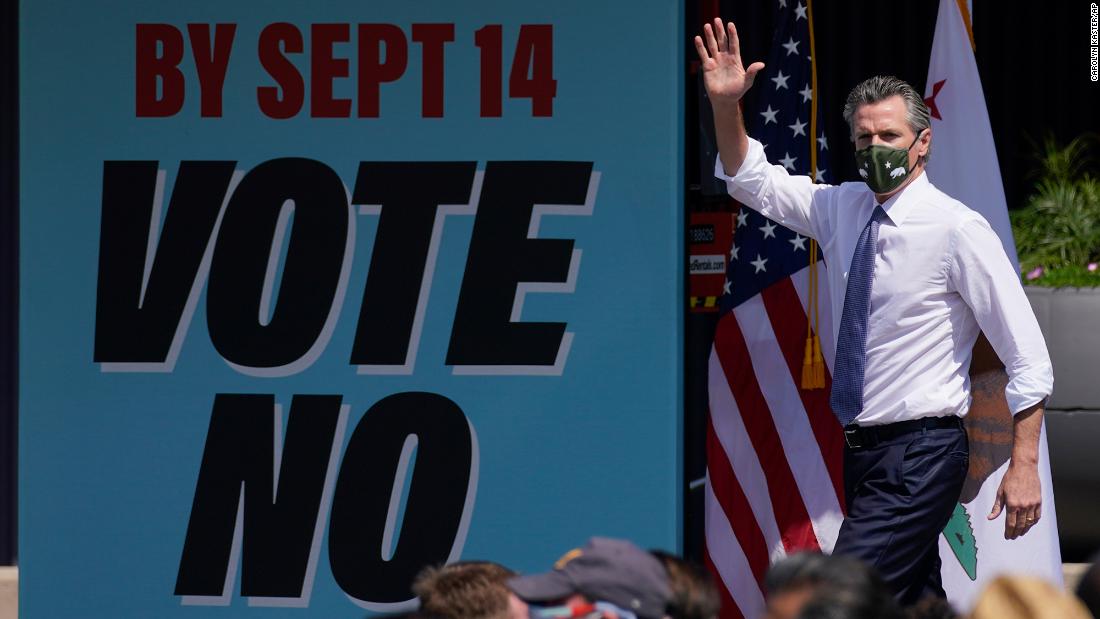Analysis: California recall speed read
It’s a bizarre situation in which a deep blue state could throw out its Democratic governor and replace him with a conservative talk show host in a proxy fight over how Covid-19 and other issues — like homelessness — have been handled.
If Newsom survives this recall effort, it will raise serious questions about whether the recall system, expensive and distracting, should be reformed.
If Newsom is removed from office, it will be an off-the-charts earthquake that shakes Democrats in every part of this country, who could view this California fight as a test of their national message of responsible Covid-19 restrictions and good governance over personal freedom.
Here’s a speed-read recap of the main points to know.
They did it by utilizing the often-attempted recall provision in the state’s Constitution to gather more than 1.5 million signatures and force a recall, although that’s a small portion of the more than 12.4 million who voted in the 2018 governor’s race.
The campaign started when the signatures were certified in July, triggering a recall campaign.
Voting has been going for weeks. Every voter in the state was sent a ballot to return by mail, so people have been voting for a month. There’s also in-person voting Tuesday.
Voters will be asked two questions: 1) Should Newsom be recalled? and 2) If so, who should replace him? He does not appear as an option on the second question.
What Democrats are telling supporters. They have not fielded a sanctioned party alternative, instead going all-in on encouraging people to oppose the recall.
What Republicans are telling supporters. There are scores of people running on question two, but Republicans, if polls are accurate, have migrated to the radio talk show host Larry Elder, who opposes most Covid-19 restrictions.
Delta changed the course of the election. Since the recall took off earlier this year, the Delta variant has flared in the US, shifting public opinion on Newsom’s handling of the virus.
Democrats sought to nationalize the race. They wanted to focus voters on their frustrations with the national GOP and not Newsom.
President Joe Biden is dropping in to view wildfire damage and, later, hold a rally to boost Newsom.
Will Newsom be recalled?
We’re going to have to let them count the votes! But, CNN’s political forecaster Harry Enten crunched polling from this recall and put it in the context of recent California elections.
The nut of his assessment is that a “no” on the recall — that is, Newsom staying in office — is the most likely outcome.
For starters, Newsom’s approval rating has generally been above 50%, suggesting less than half of Californians want him gone.
What if the polling is wrong?
It’s possible there has been some huge undetected groundswell of opposition to the governor and that he could be recalled when all the votes are counted. But — and this is an interesting tidbit to take with you into the coming midterm elections — there’s reason to believe polling in California is closer to the mark than polling elsewhere.
“Most of the biggest misses in last year’s presidential election occurred in the Midwest,” Enten writes.
Even if the polling is off in California is off to the same degree polling in Wisconsin as off in 2020, Newsom may still be okay.
Enten: “Depending on how you calculate the averages, the polling underestimated the result by about 7 points in these three states. ‘No’ is ahead on the recall by double the size of these 2020 polling misses.”
Polling, he says, has actually underestimated the strength of Democrats in California.
Why does the polling underestimate Republicans in certain states and Democrats in others?
Enten: “Republicans have tended to be underestimated in states where the majority or clear plurality of voters are Whites without a college degree such as in the aforementioned Midwestern states. In California, these same voters make up only about a quarter of the electorate.”
When will we know who won?
In-person polls close at 11 p.m. ET on Tuesday, but mail-in ballots will be counted as long as they arrive by September 21. Depending on how close things are, CNN may project results much sooner.
![]()


